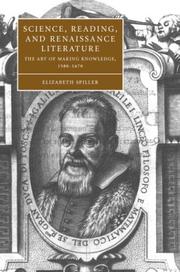| Listing 1 - 4 of 4 |
Sort by
|
Book
ISSN: 18720684 ISBN: 9004246096 9789004246096 129969098X 9781299690981 9789004246089 9004246088 Year: 2013 Volume: v. 39 Publisher: Leiden Boston Brill
Abstract | Keywords | Export | Availability | Bookmark
 Loading...
Loading...Choose an application
- Reference Manager
- EndNote
- RefWorks (Direct export to RefWorks)
The cosmology of Johannes Kepler remains a mystery. On the one hand, Kepler’s speculations on spiritual faculties are seen as the remnants of Renaissance philosophy. On the other, his comparison of the cosmos to a clock summons the mechanical metaphor that shaped modern science. This book explores the inseparable connections between Kepler’s vitalistic views and his more enduring accomplishments in astronomy. The key argument is that Kepler’s ‘celestial biology’ served as a bridge between his revolutionary astronomy and other ‘less scientific’ interests, particularly astrology. Kepler's Cosmological Synthesis sheds new light on one of the foundational figures of the Scientific Revolution. By uncovering a new form of coherence in Kepler’s world picture, it traces the unlikely intersections of mechanism and vitalism that transformed the fabric of the heavens.
Cosmology --- Astronomy --- SCIENCE / Cosmology --- History. --- Kepler, Johannes, --- Kepler, Jean --- Kepler, Johann --- Keppler, Giovanni --- Philosophy.
Book
ISBN: 1472556550 9781472556554 9781472510785 147251078X 9781472507037 9781472535405 1472507037 Year: 2013 Publisher: London : Bloomsbury,
Abstract | Keywords | Export | Availability | Bookmark
 Loading...
Loading...Choose an application
- Reference Manager
- EndNote
- RefWorks (Direct export to RefWorks)
"Kepler is a key figure in the development of modern astronomy. His work is also important in the history of philosophy and methodology of science as a whole. The present study is concerned with one of Kepler's major preoccupations, namely his search for the geometrical plan according to which God created the Universe. The author discusses how Kepler's cosmological theories, which embrace music and astrology as well as astronomy, are related to his other work. The subject will be of great interest to historians of science, mathematicians and astronomers as well as to historians of the late Renaissance."--Bloomsbury Publishing.
Cosmology. --- Astronomy --- Deism --- Metaphysics --- History. --- Kepler, Johannes, --- Kepler, Jean --- Kepler, Johann --- Keppler, Giovanni

ISBN: 9780521830867 0521830869 9780511484018 9780521037686 0511195273 9780511195273 0511195931 9780511195938 0511194609 9780511194603 9780511193866 0511193866 0511484011 0511193866 9786610477852 661047785X 1107148308 1280477857 0511314280 0521037689 Year: 2004 Publisher: Cambridge Cambridge university press
Abstract | Keywords | Export | Availability | Bookmark
 Loading...
Loading...Choose an application
- Reference Manager
- EndNote
- RefWorks (Direct export to RefWorks)
Science, Reading, and Renaissance Literature brings together key works in early modern science and imaginative literature (from the anatomy of William Harvey and the experimentalism of William Gilbert to the fictions of Philip Sidney, Edmund Spenser and Margaret Cavendish). The book documents how what have become our two cultures of belief define themselves through a shared aesthetics that understands knowledge as an act of making. Within this framework, literary texts gain substance and intelligibility by being considered as instances of early modern knowledge production. At the same time, early modern science maintains strong affiliations with poetry because it understands art as a basis for producing knowledge. In identifying these interconnections between literature and science, this book contributes to scholarship in literary history, history of reading and the book, science studies and the history of academic disciplines.
Science in literature. --- Kepler, Johannes, --- Books and reading --- English literature --- Literature and science --- Renaissance --- Science in literature --- Poetry and science --- Science and literature --- Science and poetry --- Science and the humanities --- History --- History and criticism --- Kepler, Johannes --- Kepler, Jean --- Kepler, Johann --- Keppler, Giovanni --- Great Britain --- Intellectual life --- History and criticism. --- Arts and Humanities --- Literature
Book
ISBN: 3030468585 3030468577 Year: 2020 Publisher: Cham : Springer International Publishing : Imprint: Springer,
Abstract | Keywords | Export | Availability | Bookmark
 Loading...
Loading...Choose an application
- Reference Manager
- EndNote
- RefWorks (Direct export to RefWorks)
This book traces the development of Kepler’s ideas along with his unsteady wanderings in a world dominated by religious turmoil. Johannes Kepler, like Galileo, was a supporter of the Copernican heliocentric world model. From an early stage, his principal objective was to discover “the world behind the world”, i.e. to identify the underlying order and the secrets that make the world function as it does: the hidden world harmony. Kepler was driven both by his religious belief and Greek mysticism, which he found in ancient mathematics. His urge to find a construct encompassing the harmony of every possible aspect of the world – including astronomy, geometry and music – is seen as a manifestation of a deep human desire to bring order to the apparent chaos surrounding our existence. This desire continues to this day as we search for a theory that will finally unify and harmonise the forces of nature.
Kepler, Johannes, --- Kepler, Jean --- Kepler, Johann --- Keppler, Giovanni --- Astronomy. --- Astrophysics. --- Physics. --- Geometry. --- Astronomy, Astrophysics and Cosmology. --- History and Philosophical Foundations of Physics. --- Popular Science in Astronomy. --- Mathematics --- Euclid's Elements --- Natural philosophy --- Philosophy, Natural --- Physical sciences --- Dynamics --- Astronomical physics --- Astronomy --- Cosmic physics --- Physics
| Listing 1 - 4 of 4 |
Sort by
|

 Search
Search Feedback
Feedback About UniCat
About UniCat  Help
Help News
News